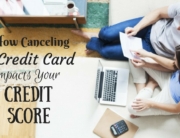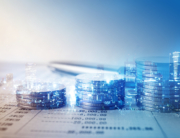Understanding Credit with RP Funding: Does a Zero Credit Card Balance Help or Hurt Your Score?
Well Robert, I know you tell us to pay off our credit cards every month, but do we pay them down to zero or do we leave a few dollars on there to show activity.
I like the idea of leaving a dollar or two on there. I don’t know though. I have kind of anecdotal evidence of both. Now, if you’re worried about your credit score, then maybe leave the dollar on there. Because some of the older credit scoring models do penalize you for having no outstanding credit and no recent utilization.
The thing is, they can’t tell you have utilization. Because if you run it up and pay it off and they just always get $0, $0, $0, $0 every month reported to them it looks like you’re just not using it. When in reality, you’re running it up. Paying it off. Running it up. Paying it off. But they don’t see that if you’re making the payment the way you’re supposed to. The way I recommend before the statement drops.
But this is only when we’re worried about our credit score. So there’s two phases in life. I mean when you’re just plug-in along and you’re not going to be borrowing any money the next 30 days, it doesn’t really matter. You can pay down to $0 at the statement due date.
 Definition of Good Credit and How You Can Get Your Score There
Definition of Good Credit and How You Can Get Your Score There
Should You Pay Your Credit Card Balance to Zero Each Month?
The only time it matters, the only time you should pay it before the statement drops and leave $1 or $2 on there, is when you know you’re going to be needing your credit.
If you know you’re going to be buying a car next month. And again, if we’re financial ninjas and we’re planning ahead, we’re not just on a whim rushing out there and buying a car. We’re following the three day rule. We’re planning ahead. We’re making good decisions. We’re budgeting. We’re not going to find ourselves in a situation where we unexpectedly need to apply for credit.
I would say for normal course of life, just pay the thing off. It’s easier to do. And that way there’s $0 and there’s no interest. And that’s going to save you the most money. But if you think you may end up applying for credit, maybe leave a buck on there or something. But make sure you do pay it down before the statement is printed. Because once they print and mail the statement or once they generate the PDF, that’s the amount that gets reported on your credit.
If you think about timing wise, a lot of people will charge about $1,000 on their card and they generate the PDF. We get it in the mail or via our phone and then we pay it off. The credit bureau doesn’t see that because they only get the dollar amount that was owed when the PDF was generated or the statement was printed.
So if you want to have that dollar balance or zero balance, you have to make the payment the day before the statement is printed. Which is not the due date. The due date it’s not for like another 20 days. This is before the payment statement is even generated. If you want to have that loan balance reported on your credit.
So we really don’t have a definitive answer. FICO does not give us the exact formula. From my own personal testing I can tell you that some of the scores reward you for having $1 or two small balance. Because, then they know you use it and it’s not just always zero and like you’ve cut them up.

How Canceling a Credit Card Impacts Your Credit Score
What to do with a Zero Balance Credit Card
I heard this somewhere on the way. I don’t know who originally came up with this idea. It was not me, but I’m a fan of it. So instead of cutting your credit cards up, you freeze them in a block of ice. So if you don’t want to use your credit cards, take them and put them in a glass of water. And then put them in the freezer and freeze them in that water.
So now if you need them you have to thaw them out. And so it gives you time to think about it. You can’t put them in the microwave because they’re plastic.
So you’ve got like run some water over them or like in there with the ice pick trying to chisel the cars out of the block of ice. But it gives you enough time to really think of like, do I really want this purchase bad enough? Like you’re at home watching the infomercial on the Ginsu knives and you ask yourself, “do I really want them bad enough to go in there and thaw out the stupid block of ice Robert Palmer made me do.” And then refreeze them afterwards. You’re thinking, “no it’s not worth it.”
If it’s a really important purchase, you’d go thaw them out. As an example, if you need to send your kid to college and put their books or tuition on your credit card, you’ll go thaw the block ice. But, for the stupid spur of the moment midnight Ginsu knife, no. You’re gonna leave that in the block ice and move on.





